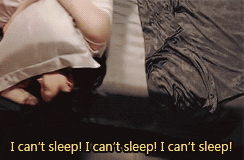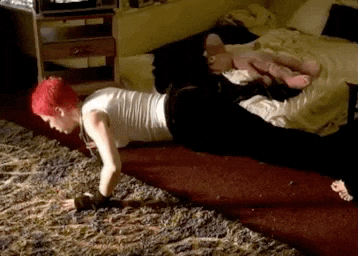If you want to jump to a section, just tap the link.
After the longest, most stressful day, all you want is a long night’s rest. Sadly, stress can even make falling asleep challenging despite feeling exhausted, especially when things are more overwhelming than usual.

Being so stressed that you can’t fall asleep is, unfortunately, normal. The more stressed you are, the higher your heart rate is and the breaths you take are more shallow.
These factors put you in a state serious discomfort, making it seem as though sleep is impossible. However, there are some simple tips and tricks that you can do to combat this from keeping you up all night long.
Depending on your stress levels and what your regular routines look like, things as easy as reading or deep breathing may be able to help get you catching z’s even when you’re the most tightly wound.
Exercise or Yoga During the Daytime
An easy way to get your stressed body exhausted before bedtime is through exercise during the day. Whether it’s a high-intensity cardio routine, a jog, or a relaxing yoga session, any form of exercise may be the trick to getting your mind and body to loosen up at the end of the day.

Find an exercise or yoga routine that works seamlessly within your schedule (and with your body) and make it a staple of your everyday life; when you do this, your body is going to be craving sleep by the time your head hits the pillow.
However, it is important not to be exercising too close to bedtime as this can actually wake you up more. Exercising often revs up your heart rate and stimulates the brain, making it tough to wind down afterword.

When you exercise during the day, it gives your body time to eventually unwind and become more tired than if you hadn’t burned those calories. This does depend on the person, so just find what works best for you and your sleep cycle, and stick with it.
Read or Listen to Music Before Bed
Often, the reason you can’t fall asleep at night when you’re stressed is because of your racing thoughts. You’re extremely distracted and cannot get your mind to focus on anything besides your worries or pressing matters. If this is familiar to you, reading a few chapters or listening to music before bed may be able to do wonders for your sleep patterns.
Both reading and listening to music can put you in not only a different headspace, but a whole different world. No longer do you have to be stuck in bed and riddled with anxiety; instead, you’re whoever you are in your book or in your songs.

Focus more so on the words on the page or the lyrics in your ears, and your mind may become so engrossed it’ll have no choice but to drift off to sleep. This is often a great way to prepare your brain for the dream state it’s working towards while simultaneously rejecting real-world stressors.
Pick up your favorite book or listen to that podcast your friend has been raving about, and let your mind travel elsewhere.
Try Breathing Techniques
Easy and able to be done right in bed, breathing techniques are a great way to try to relieve your mind and body of as much stress as possible. There have been various techniques crafted specifically with the idea of sleep in mind, and they’re as simple as taking some deep inhales and exhales over the course of a few minutes.
From learning to deepen your breaths and un-tense muscles to forcefully exhaling your stressors, breathing techniques are easy, natural ways to get your body in a more relaxed, mindful state.
When you do this you’re, again, focusing on something other than your preoccupations, as well as working to naturally slow your heart rate. As you breathe, pay close attention to how your body feels: is anything uncomfortable?
Adjust your movement and breaths meticulously, and teach yourself to breathe in ways that make your body feel its best. This way, you’re able to achieve a full-bodied feeling of calm as well as comfort to help you peacefully fall into a deep rest all night long.
Record Your Thoughts

For the times when your mind just won’t shut off, try writing your thoughts down. Usually, when you let your thoughts race around your brain, they seem realistic, plausible, and like something worthy of keeping you up at night.
However, if you take the time to actually write these thoughts down, manifest them on a piece of paper or even just your phone, it becomes obvious when you’re being irrational. Stress can frequently cause some seriously unrealistic thoughts, but they sure don’t seem unrealistic at the time. That is, unless you write them down.
You can also try writing down a to-do list or schedule if you’re stressed about all that you need to accomplish. This way, your pressing matters seem more manageable, and you have a visualization of what needs to get done.
Plus, the act of writing, in general, is extremely therapeutic and can help promote feelings of calm. Try doing this before bed to let your mind unwind and your thoughts organize before trying actually fall asleep.
Don’t Panic!

When you’re trying to go to bed when you’re stressed, you're sure to know it. Often, this hyper-awareness makes it worse, and you become even more stressed with the idea of trying to get sleep. (We know you’ve been there.)
In these circumstances, the best thing to do is to remember that bad sleep is perfectly normal. We all experience a few poor nights of rest every once in a while, but that doesn’t mean you’ll never sleep well again.
Skip the tossing and turning and turn to a book or deep breathing to get you feeling more stable. Just as you’re remembering that your stress isn’t permanent, you’ll likely already be drifting off into your dreams.

